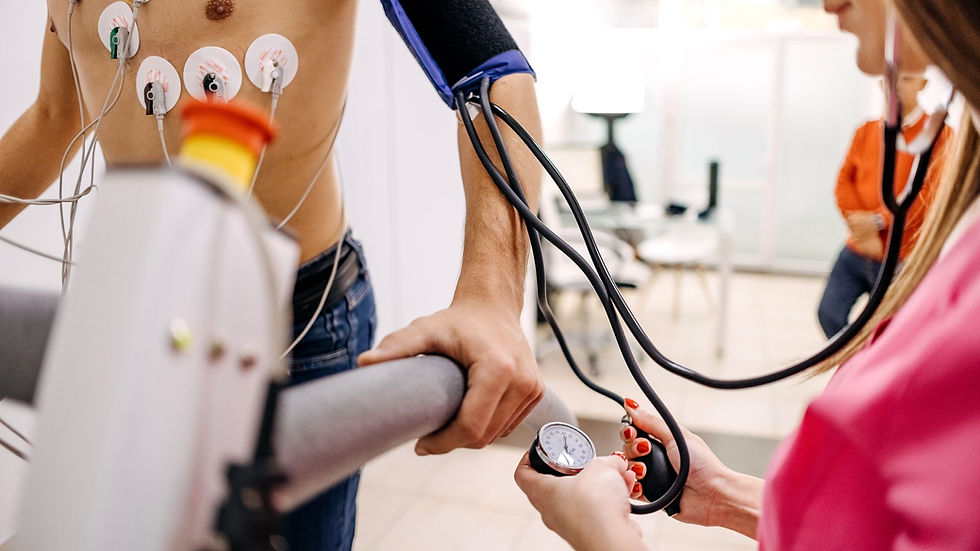Cardiac Rehabilitation: Rebuilding Heart Strength and Confidence
- tim86161
- Aug 18, 2025
- 2 min read
Updated: Oct 10, 2025

Cardiac rehabilitation (commonly known as cardiac rehab) is a structured, evidence-based program designed to help you recover after a heart event, such as a heart attack, surgery, or diagnosis of heart disease. It combines education, exercise, and support for long-lasting health improvements.
What Is Cardiac Rehabilitation?
According to the Heart Foundation, cardiac rehab is a personalised program involving support, exercise, and education led by healthcare professionals. It is tailored to each individual—safe for all fitness levels—and proven to keep patients out of hospital and reduce the risk of death from heart conditions .
Typically running for 6 to 10 weeks, cardiac rehab usually begins in hospital and continues in the community, at home, or via telehealth options .
Who Should Join Cardiac Rehabilitation?
Cardiac rehab is recommended for patients who have experienced:
Heart attack or unstable angina
Coronary stenting or bypass/valve surgery
Heart failure or cardiomyopathy
Pacemaker or defibrillator placement
Rhythm disorders like atrial fibrillation
Cardiac arrest or pulmonary hypertension
Attending improves recovery, reduces future risk, and supports lifestyle adaptations—across both physical and emotional dimensions .
What Happens During Cardiac Rehab?
A cardiac rehab program typically involves:
A multidisciplinary team: including physiotherapists, exercise physiologists, dietitians, psychologists, nurses, and pharmacists
Tailored exercise programs, combining aerobic and resistance training to suit your condition and ability
Education on heart conditions, medication management, healthy eating, stress, and symptom awareness
Emotional support and counselling, helping you cope with anxiety, depression, and lifestyle changes
Referrals typically begin during hospital discharge, and sessions may take place in hospitals, community centers, or via telehealth—making rehab accessible whether you’re in a metro area or remote .
Why Cardiac Rehab Works: Evidence & Outcomes
Participants experience improved health and well-being, with lowered risk of repeat cardiac events .
A linked data study showed that attending rehab improved 12-month clinical outcomes, supporting its vital role in ongoing cardiac care .
For patients with chronic heart failure, regular moderate exercise through cardiac rehab improved quality of life and reduced hospital admissions—with strong evidence backing its effectiveness .
Across cardiac health, evidence-based programs with structured aerobic and resistance training form the backbone of effective rehab .
Frequently Asked Questions (FAQs)
1. Can I do cardiac rehab from home?
Yes—Telehealth cardiac rehab options are available and supported by the Heart Foundation for people in remote areas or with mobility constraints .
2. How long before I feel better?
Most programs run for 6–10 weeks, though recovery time varies. Many people notice improvements in energy, mood, and fitness early in the process .
3. Do I need a referral?
Yes—a referral from your doctor, cardiologist, or healthcare provider is needed for a phase 2 program. You can use the Heart Foundation’s Cardiac Services Directory to find available community programs where you don’t need a referral.
4. Who else benefits from rehab?
Those with heart failure, arrhythmia, post-surgery care, or device implantation and at-risk individuals—including women and culturally diverse groups—benefit from tailored rehab programs .
Final Thoughts
Cardiac rehabilitation is a proven, vital part of heart recovery and long-term well-being. At Body Fit Physiotherapy North Adelaide, we work with healthcare teams to ensure you receive compassionate, evidence-based care that rebuilds strength, improves lifestyle habits, and supports ongoing heart health.








Comments